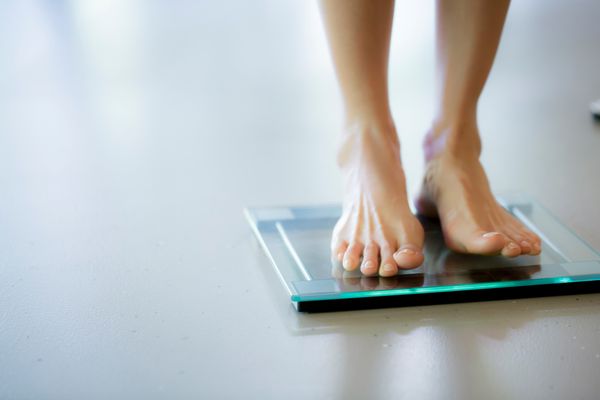If you're planning once again to make some New Year's resolutions but are tired of making the same ones over and over and over again, here's something for you: a dive into what's getting in the way of your desire to shed some pounds.
Sometimes you need to silence your inner critic from telling you that you have no self- control—and finally find the truth behind it all.
Read more about 7 Ways to Stop Overeating Once and For All.
Pain.Chronic pain can lead to unwanted weight gain in many ways. Side effects from medications, like anti-inflammatory steroids, can make the scale creep up. Being in pain can make it more difficult to be active or can make you avoid exercise for fear of worsening your pain. And the stress of chronic pain can lead to overeating.
What to do: Be mindful of portions. If your medication makes you hungry, stock up on healthy snacks like veggies and fruit. Talk to your health care professional about safe and effective exercises, which can help manage chronic pain. Ease your pain naturally using at-home massage with this deep-tissue massager by Wahl, which can attack and relieve muscle pain deep below the surface and pinpoint specific problem areas. Lots of research has shown that massage can effectively ease chronic pain and help improve quality of life.
Skimping on sleep. Along with yawning, under-eye bags, difficulty concentrating, moodiness and fatigue (obviously) comes another fallout from not getting enough sleep—and that's weight gain. How? Well, for one thing, studies show that regions of your brain will cause you to crave more "comfort" foods (as in chips and cookies) than "healthy" ones (as in carrot sticks and apples). And you'll eat more of them, too, because sleep deprivation increases hunger by ramping up the hunger hormone known as ghrelin, which is responsible for increasing your appetite. Conversely, the hormone leptin, which signals your brain that it's full, just about goes missing.
What to do: Get the sleep you need by practicing good sleep routines: Keep your room cool, quiet and dark, and shut down any electronic devices at least 30 minutes before turning in. Avoid caffeine after 3 p.m., and limit your alcohol consumption—though it can initially make you sleepy, alcohol can cause you to sleep restlessly and wake throughout the night.
Menopause. Hormones are changing; most notably your estrogen is declining. And that is partially responsible for the weight you're gaining, especially around your middle. This finding was part of a large 2012 study by the International Menopause Society. Scientists found that hormonal shifts were the likely culprit in the distribution of body fat in menopausal women. That reduction in estrogen can also lower your metabolic rate, making weight gain more likely. The loss of muscle mass, which comes naturally with aging, can also affect your metabolism, slowing it even further. Read more about menopausal weight gain.
What to do: Stay active and engage regularly in both aerobic exercise and resistance training. Watch your portions and make sure to eat mindfully.
Mindless eating. If you're eating in the car while you're driving, eating in front of the television, snacking out of a bag while watching a movie or eating while you're reading a magazine or scrolling through emails, it's likely you're unaware of what and how much food is going into your mouth. That's mindless eating, and it's a recipe for weight gain. Oftentimes, it's changing behaviors—rather than "going on a diet"—that can help people lose weight.
What to do:
- Don't eat directly from the package. Instead, dole out a reasonably-sized portion, and put the bag away, out of sight.
- Set down your utensils between bites to slow your pace.
- Chew each bite thoroughly.
- Eat without distractions.
- Take a few moments before going for seconds to make sure you're really hungry.
Stress. Anxiety is a big trigger for overeating, making unhealthy food choices and eating when you're not even hungry. While, for some, stress can shut down appetite in the short term, prolonged or persistent stress can cause your adrenal glands to pump out cortisol, which in turn increases appetite. Cortisol, the stress hormone, also increases motivation, and with it, the motivation to eat.
Stress has also been found in studies to increase the types of food you crave—and, of course, it's not of the celery-stick variety, but rather the sugary, fatty types of foods. As if that isn't bad enough, once you eat these foods, they quell your stress, which only reinforces the desire for more. Here are some tips to help you outsmart food cravings.
What to do: Meditation, social support and exercise all go a long way toward managing and counteracting stress that can send your appetite into overdrive. Learn more about how to avoid emotional eating.
Medications. Common prescription drugs can cause unwanted weight gain. Sometimes it's the drug itself that can affect how your body absorbs and stores glucose, or it may slow your body's metabolism. Other times it's the side effects from the drug. Some can stimulate your appetite; others may cause shortness of breath or fatigue, which would cause you to exercise less or not at all, while some may cause you to retain water.
Some medications, though they don't necessarily cause weight gain, can make it hard to lose weight.
The drugs most commonly associated with weight gain include corticosteroids, antidepressants, diabetes medications like insulin, certain heartburn drugs, hormone therapy or contraceptives and anti-seizure drugs like valproic acid (Depakote).
What to do: If you think your medication could be to blame for weight gain, be aware of your food intake by keeping a food diary. Make time for exercise, even if it's just a walk. When your health care provider prescribes a medication, ask if it causes weight gain and, if so, if there is an alternative to it.







